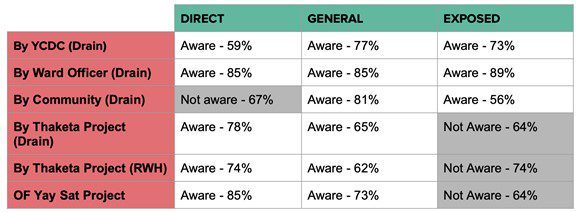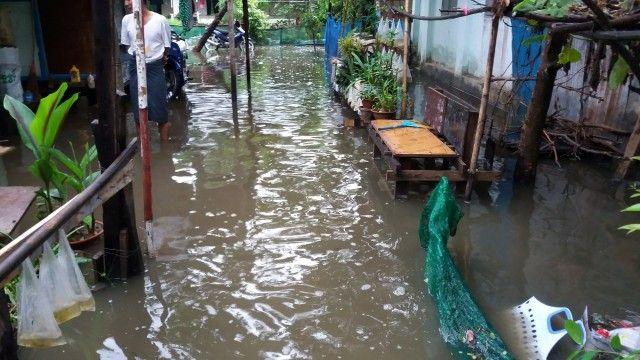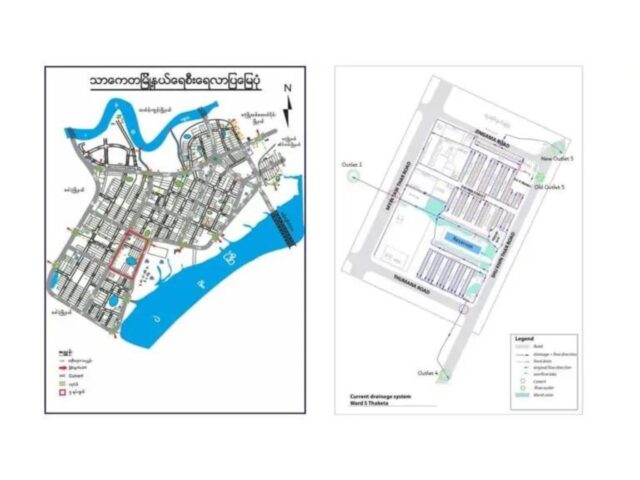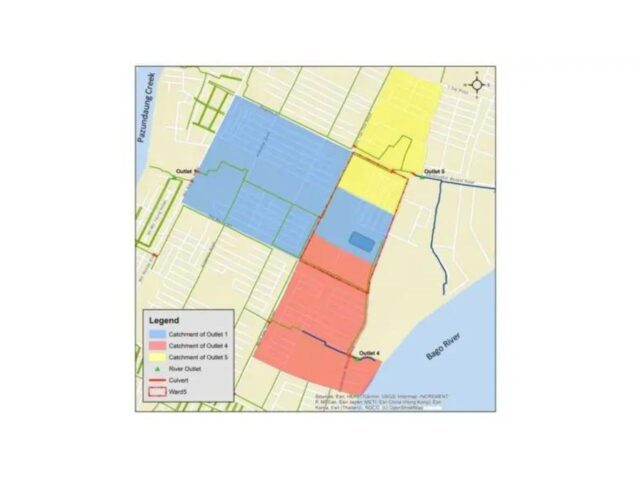Introduction & Basic Information
Waste management is a vital part of a healthy living environment, both during the rainy season as well as in the dry season. Especially waste ending up in the drainage system has two main negative impacts:
- blocking the water flow, increasing the risk of flooding
- contaminating the water, increasing the risk of diseases
The rapid economic growth with urbanisation and industrialisation in Myanmar has led to significant challenges with the management of waste. Daily waste generation, especially in three of the largest cities in the country (Yangon, Mandalay and Nay Pyi Taw), have increased dramatically, which in turn is leading to public health issues and environmental pollution. Typically, one to two-thirds of generated waste in many townships is not properly collected, and uncollected waste is often dumped on open land, and in the streets and waterbodies causing pollution to both surface and groundwater. In addition, the volume of industrial and other hazardous waste is also growing rapidly in Myanmar emphasising the importance of an integrated approach to manage all waste.
Waste management in Yangon is a responsibility of the government, through the waste department of Yangon City Development Committee (YCDC). The tasks of the responsible YCDC department (PCCD: Pollution Control and Cleaning Department) consist of collecting waste along the main roads of the city, providing the necessary infrastructure and assets (mainly bins) and processing the waste. There is also an extensive informal waste collection system, with waste pickers and junk shops business etc. Finally, the residents themselves have an important role to play as well.
Proper solid waste management is important to create a livable, attractive living environment and specifically to create the circumstances for a well-functioning drainage system. There are different possible ways to improve solid waste management:
- improve waste management by the community
- improve waste management by the local government (see here)
Concrete interventions to improve solid waste from a community perspective
- working on awareness on solid waste management (why is it important, what can I do?)
- improving the logistics and physical infrastructure,e.g. adding more bins
- improve waste segregation on a community level
- adding more physical infrastructure to promote proper waste management, e.g. through adding a recycling station, a compost station
- improving the areas around the physical infrastructure (and more generally the overall living environment) through placemaking, so keeping it clean gets easier and is promoted.
- organize a cleaning campaign/ event, e.g. before the rainy season, to promote awareness and prepare the area for the coming rains.
- work on a direct connection network between the community as waste producers and informal recyclers (waste pickers and junk shops)
Relation to climate resilience
A good waste management system is linked to climate resilience in a few ways.
Firstly, irresponsible waste management can contribute directly to climate change, for instance by adding carbon-based particles into the air through incineration of waste. Often household waste (including plastic waste) is burnt, as it is an easy way to get rid of waste, but it’s harmful for the environment as well as giving unpleasant smoke and smell on the streets. Same goes for leaves and other organic matter, which is often burnt on the streets.
Moreover, as explained before, waste accumulation contributes to an unhealthy environment, as it can spread diseases and attracts pests like rats. Climate change leads to an increased chance of flooding, also increasing the negative impact of a not properly functioning waste system.
Stakeholder Engagement
The interventions related to improving waste management can largely be done by the community themselves, but often input from others (like local government, Ward officer, local contractors) is needed as well.
To work with the community living in ward 5, the community engagement team of Thaketa Climate resilience project is focusing on:
1) Understanding : Asking the community their opinions on where is the waste in their neighborhood / what are the effects/ main issues/ challenges
2) Awareness : Presentation/Publish data collected from the community, Sharing the impacts of current actions towards waste disposal
3) Provoke the reactions of the community by showing the ward pictures
Finally, local contractors and (both formal and informal) waste collectors are an important group of stakeholders here as well. In Yangon, there is an extensive network of formal and informal waste collectors that earn their money through collecting waste and bringing this to collection points, often in collaboration with the local government. Interventions related to waste management can have an impact on their businesses.
Date Collection & Analysis
Data collection is an extensive process of collecting information to make direct observations and answer open ended questions.To hold the quantitative analysis, we did a survey among the community of ward 5 halfway the project, to better understand the main issues related to waste management.
The community of ward 5 mostly mentioned flooding as the most important impact of climate change, interestingly they mentioned water scarcity later than the higher temperature which means hot on a daily life basis.

Related to the interventions of the drain and solid waste, the awareness by the Community is surprisingly lower than the awareness by the rainwater harvesting intervention of Thaketa project. However the awareness by ward officers and YCDC were generally not much different from each other.
In addition, the community also thought that the causes of drainage issues are not only blocked by trash but also the drains are too narrow. They also mentioned that blocking by vegetation is one of the main causes with respect to the technical point of view for sedimentation.


In the scope of the waste management system, how to throw away the household trash runs one of the vital factors to consider. According to our survey, the community on ward 5 disposed of the household waste daily less than those who dispose a few times a week.
The waste management habits also depend on some facts which the community mentioned in our survey as the following :
1) knowing where to throw trash
2) accessibility to throw trash
3) trash bins are far away
4) knowing where the trash cars comes
5) the sufficient limitation that YCDC collects waste regularly.
And the community admit that they cannot perform in reality because of the insufficiency of trash bins properly on the road and in the streets though they are aware of how and where to throw the waste.


Multi Criteria Analysis
In order to improve waste management by the community, it is not easy to implement and impact is high, on the other hand, the placement of bins, bags and agencies to collect wastes could cost medium rate including the community and partners.
Engaging with the community takes an important role by taking man hours of the project team, though the complex technical challenges were not there including recycling and composting elements but have to arrange for whole ward (large scale engagement) and essential to get permission from government.
Content & Technical Design
Within the project we worked on three main interventions related to waste management by the community:
- Work on a waste collection campaign led by local community/ Online Campaign (people cleaning around their house – every little thing counts & post pictures of your activities online) (example clean Yangon) – behavioural change – e.g. showing people the nearest bin
- work on community education sessions on waste separation, composting. This should be done together with representatives of the local government, so the government learns about community struggles and they can discuss directly with the residents how to improve the situation.
- Discuss options to implement recycling stations in the ward, including place making around the stations to make these locations attractive so people will use them and keep them clean and well-maintained





